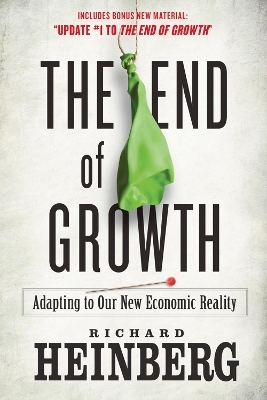
The End of Growth
New Society Publishers (Verlag)
978-0-86571-695-7 (ISBN)
- Titel z.Zt. nicht lieferbar
- Versandkostenfrei innerhalb Deutschlands
- Auch auf Rechnung
- Verfügbarkeit in der Filiale vor Ort prüfen
- Artikel merken
Economists insist that recovery is at hand, yet unemployment remains high, real estate values continue to sink, and governments stagger under record deficits. "The End of Growth" proposes a startling diagnosis: humanity has reached a fundamental turning point in its economic history. The expansionary trajectory of industrial civilisation is colliding with non-negotiable natural limits. Richard Heinberg's latest landmark work goes to the heart of the ongoing financial crisis, explaining how and why it occurred, and what we must do to avert the worst potential outcomes. Written in an engaging, highly readable style, it shows why growth is being blocked by three factors: resource depletion; and, environmental impacts and crushing levels of debt. These converging limits will force us to re-evaluate cherished economic theories and to reinvent money and commerce. This book describes what policy makers, communities, and families can do to build a new economy that operates within Earth's budget of energy and resources.
We can thrive during the transition if we set goals that promote human and environmental well-being, rather than continuing to pursue the now-unattainable prize of ever-expanding GDP.
Richard Heinberg: is the author of nine previous books including The Party’s Over, Peak Everything, and Blackout. He is a Senior Fellow of Post Carbon Institute, a think tank helping chart humanity’s transition from the brief, waning reign of fossil-fueled megatechnology to the dawning era of re-adaptation to nature’s limits. Widely regarded as one of the world’s foremost Peak Oil educators, Richard lectures widely and appears on radio, television, and in films. With a wry, unflinching approach, he explains the trends that shape our world.
Acknowledgments
Introduction: The New Normal
Why Is Growth Ending?
The End of Growth Should Come As No Surprise
Why Is Growth So Important?
But Isn't Growth Normal?
The Simple Math of Compounded Growth
The Peak Oil Scenario
From Scary Theory to Scarier Reality
Bursting Bubbles
What Comes After Growth?
A Guide to the Book
1. The Great Balloon Race
Economic History in Ten Minutes
Economics for the Hurried
20th-Century Economics
Business Cycles, Interest Rates, and Central Banks
Mad Money
I Owe You
2. The Sound of Air Escaping
Houses of Cards
Setting the Stage: 1970 to 2001
Shadow Banks and the Housing Bubble
What Goes Up
The Mother of All Manias
Limits to Debt
All Loaned Up and Nowhere to Go
Stimulus Duds, Bailout Blanks
Actions by Other Nations and Their Central Banks
After All the Arrows have Flown
Deflation or Inflation?
The Bridge to Nowhere
3. Earth's Limits: Why Growth Won't Return
Oil
Other Energy Sources
How Markets May Respond to Resource Scarcity: The Goldilocks Syndrome
Water
Food
Metals and Other Minerals
Climate Change, Pollution, Accidents, Environmental Decline, and Natural Disasters
4. Won't Innovation, Substitution, and Efficiency Keep Us Growing?
Substitutes Forever
Energy Efficiency to the Rescue
Business Development: The Cavalry's on the Way
Moore's or Murphy's Law?
Specialization and Globalization: Genies at Our Command
5. Shrinking Pie: Competition and Relative Growth in a Finite World
The China Bubble
Currency Wars
Post-Growth Geopolitics
Population Stress: Old vs. Young on a Full Planet
The End of "Development"?
The Post-Growth Struggle Between Rich and Poor
6. Managing Contraction, Redefining Progress
The Default Scenario
Haircuts for All...or Free Money?
Post-Growth Money
Post-Growth Economics
Gross National Happiness
Our Problems Are Resolvable In Principle
7. Life After Growth
Setting Priorities
Transition Towns
Common Security Clubs
Putting the New Economy on the Map
What Might a Sustainable Society Look Like?
Perspective
Notes
Index
About the Author
| Erscheint lt. Verlag | 1.9.2011 |
|---|---|
| Verlagsort | Gabriola Island |
| Sprache | englisch |
| Maße | 152 x 229 mm |
| Gewicht | 315 g |
| Themenwelt | Naturwissenschaften ► Biologie ► Ökologie / Naturschutz |
| Wirtschaft ► Volkswirtschaftslehre | |
| ISBN-10 | 0-86571-695-1 / 0865716951 |
| ISBN-13 | 978-0-86571-695-7 / 9780865716957 |
| Zustand | Neuware |
| Haben Sie eine Frage zum Produkt? |
aus dem Bereich


